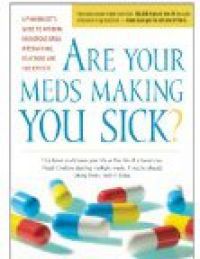Are Your Meds Making You Sick?
What if a book really could save your life. Would you buy it?”
That’s the question pharmacist Robert Steven Gold poses while touting his book Are Your Meds Making You Sick? A Pharmacist's Guide to Avoiding Dangerous Drug Interactions, Reactions and Side Effects. Gold, a longtime Indiana pharmacist and Perdue University clinical pharmacy instructor, penned the 280-page paperback after his father suffered side effects from his medicine.
Instead of a dull, uninspiring book that relies on boring lists, Gold uses 30 fascinating case histories of real people to serve as a practical guide to the devastation that drug interactions, reactions and side effects can wreak - and each includes the chances of you experiencing a similar fate. Set up as mini-mysteries, they entice readers to solve the puzzle - and learn something in the process. In one case Gold tells readers how they can spot a dangerously high level of calcium; another pinpoints the pitfalls of prednisone.
Although Gold uses alarming statistics (“up to 2 million people are hospitalized or die each year because the medicines they took to make them well made them worse”), he does so not as a scare tactic, but as a warning.
And as some of his examples show, even the most innocuous medicines can harm your liver, kidney brain and heart if your medical history and other factors are taken into account. Gold also explains why it’s imperative to follow his 16 Rules of Safe Medication Use (knowing your kidney and liver lab values is essential), gives specific examples of the 36 most problematic drugs (insulin, warfarin and digoxin are among them) and discusses some common herbs, supplements and diet pills that have potentially dangerous interactions with prescription and Over-the-Counter drugs.The book is sprinkled with helpful advice - for those taking prescriptions to combat high blood pressure, Gold cautions: “If you experience a cough soon after starting an ACE inhibitor, think drug reaction. Early in the book, Gold urges consumers to report problems they have with medications to their pharmacist, doctor and/or the FDA. “The problem,” Gold writes, “is that no one has to report any adverse reaction a patient may experience from a drug.”
While it’s easy to skip around in the book, we urge you not to miss the Reader’s Guide to Medications on Page 232, an easy-to-understand primer for everything from acetaminophen to morphine and the Medical Record on Page 269, an easy-to-use chart with spaces to record medicines taken, what they look like, dosage and which doctor prescribed them.
Lifesaving, indeed.

